My Aging Client Loses Their Train of Thought in Conversation—What Can I Do?
Presented by Sarah Baar and Alyssa Lanzi

12-Month Subscription
Unlimited access to:
- Thousands of CE Courses
- Patient Education
- Home Exercise Program
- And more
Nonfinancial: Sarah Baar is a chapter author in Neurogenic Communication Disorders and the Life Participation Approach. She has has no other competing nonfinancial interests or relationships with regard to the content presented in this course.
Financial: Alyssa Lanzi is a consultant for Honeycomb Speech Therapy LLC. She is also an employee for the University of Delaware. She does contracted research for the National Institutes of Health (NIH). She receives compensation from MedBridge for this course.
Nonfinancial: Alyssa Lanzi is a Governing Board member for TalkBank and an Executive Committee member for Delaware Center for Cognitive Aging Research. She has has no other competing nonfinancial interests or relationships with regard to the content presented in this course.
Speech Scope Episode 4: My Aging Client Loses Their Train of Thought in Conversation—What Can I Do?
Join Alyssa Lanzi, a seasoned clinical researcher, as she talks with Sarah about tackling the sticky situation of word-finding challenges in older adults with and without a diagnosis of Alzheimer’s disease. In this insightful conversation about aging, they explore strategies for organizing thoughts around vague client language complaints and gain valuable insights into assessment and treatment for mild neurocognitive disorders.
Learning Objectives
- Interpret the evidence around language changes that are not a normal part of aging
- Develop assessment and treatment choices that assist the SLP in speech therapy for vague word-finding complaints
- Apply evidence-based, practical strategies to actionably address word-finding challenges in clients without a primary language disorder diagnosis
Meet your instructors

Sarah Baar
Sarah is a speech-language pathologist in Grand Rapids, Michigan. She has had the opportunity to work in many settings across the continuum, including acute care, acute rehab, home and community, and outpatient therapy, and has been involved in various leadership projects. In 2016, she started the Honeycomb Speech Therapy…

Alyssa Lanzi
Alyssa M. Lanzi is an assistant professor in the Department of Communication Sciences and Disorders at the University of Delaware and is on the Executive Committee for the Delaware Center for Cognitive Aging Research at the College of Health Sciences. Dr. Lanzi is an academic speech-language pathologist and has dedicated her…
Chapters & learning objectives
More courses in this series

Is the Clock Drawing Test Still Relevant? Then What?
Sarah Baar and Samantha McDaniel

Severe Global Aphasia: Where Do I Start?
Sarah Baar and Treasyri Williams Wood

INCOG 2.0: How to Manage Cognitive Communication and Social Cognition
Sarah Baar and Penny Welch-West

My Aging Client Loses Their Train of Thought in Conversation—What Can I Do?
Sarah Baar and Alyssa Lanzi

How Can SLPs Think More Broadly About Decisions in Dysphagia Management?
Sarah Baar and Tim Stockdale

Is There Reason to Hope With PPA?
Sarah Baar and Lisa Wauters

What Is an SLP’s Role Related to Home Programs for People With Aphasia?
Sarah Baar and Sarah E. Wallace
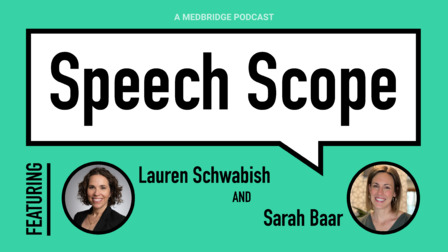
Working Memory: How Can I Address This in a Meaningful Way?
Sarah Baar and Lauren Schwabish

What Should SLPs Know About Cancer-Related Cognitive Impairment?
Sarah Baar and Patricia Geels

How Can SLPs and ATCs Work Together for Sports Concussion Management?
Sarah Baar and Tabia Pope

How Can We Help Patients With Functional Voice Disorders Find Their Voice Again?
Sarah Baar and Adam T. Lloyd

How Can Respiratory Muscle Training Impact Neurodegenerative Diseases?
Sarah Baar and Brooke Richardson

AI Speech Therapy: What Ethical Considerations Should I Think About?
Sarah Baar and Nina Benway

Return to Work and TBI: How Can SLPs Help?
Sarah Baar and Peter Meulenbroek

Dysarthria and Life Participation: Where Do I Begin?
Sarah Baar and Carolyn Baylor

Palliative or Just Good Care? Where Does SLP Fit In?
Sarah Baar, Marta Kazandjian, and Cynthia X. Pan
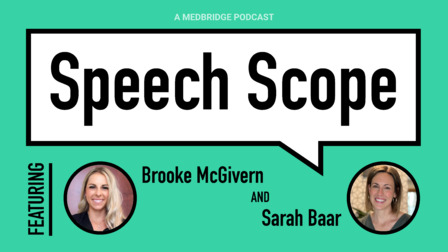
What Is Proactive Dysphagia Treatment for Head and Neck Cancer?
Sarah Baar and Brooke McGivern
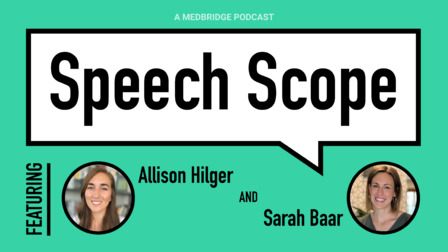
What’s the Colorado Motor Speech Framework, and How Do I Use It?
Sarah Baar and Allison Hilger
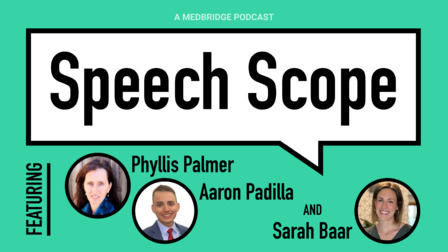
Dysphagia Decisions: What’s In and What’s Out?
Phyllis M. Palmer, Sarah Baar, and Aaron H. Padilla
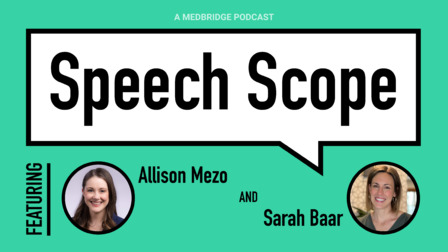
Anosognosia: What Are Key Clinical Assessment Considerations for SLPs?
Sarah Baar and Allison Mezo
